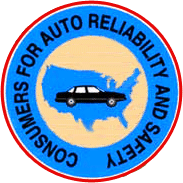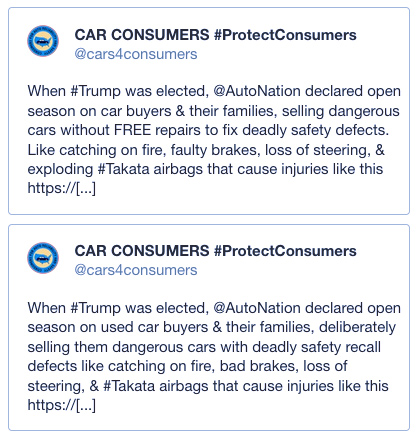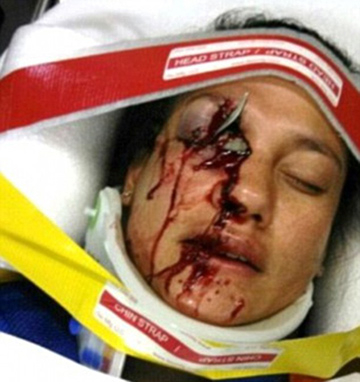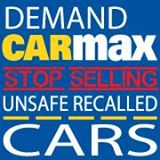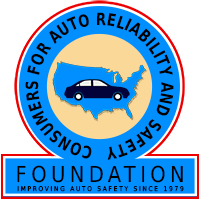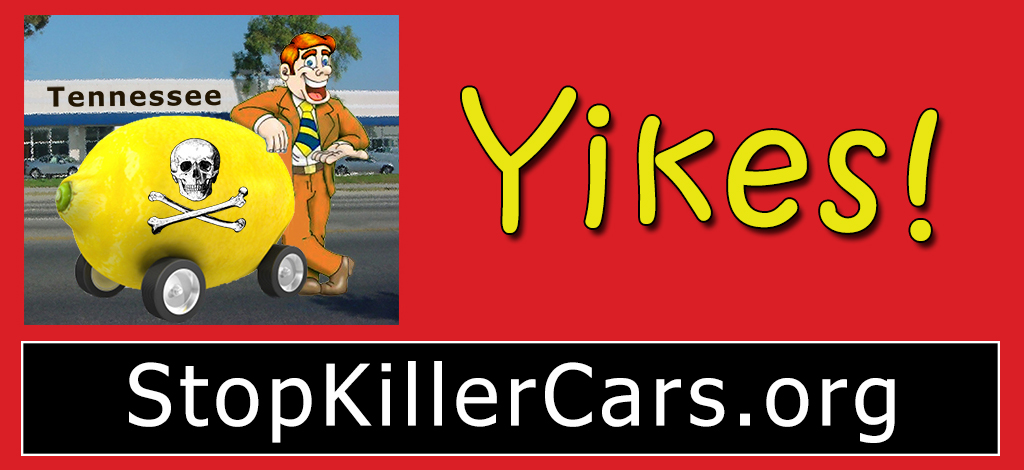Consumers for Auto Reliability and Safety
Consumer Action
Center for Auto Safety
Center for Justice and Democracy
Consumers Union
Consumer Federation of America
National Consumers League
National Association of Consumer Advocates
U.S. Public Interest Research Group
August 3, 2009
Commissioner Jon Leibowitz
Commissioner Pamela Jones Harbour
Commissioner William E. Kovacic
Commissioner J. Thomas Rosch
Federal Trade Commission
600 Pennsylvania Avenue N.W.
Washington, DC 20580
Re: Petition to Modify 16 CFR Part 455, Used Motor Car Trade Regulation Rule, on an Expedited, Emergency Basis
The above-listed non-profit organizations, which have a combined membership of more than 50 million, hereby petition the Federal Trade Commission to modify 16 CFR Part 455, the Used Motor Car Trade Regulation Rule, to warn prospective purchasers of vehicles produced by manufacturers that have been sold in bankruptcy, with the new company failing to assume liability for future product liability claims involving those vehicles. Those purchasers face additional risks, due to the lack of basic protections provided under state and common law against other manufacturers.
Due to the serious, immediate threat posed by the vehicles to the purchasers and their passengers, or their survivors, should they suffer debilitating injuries or fatalities due to manufacturer-caused defects, petitioners further request that the rulemaking be conducted on an expedited, emergency basis.
Used Car Rule already requires basic disclosures
The Commission promulgated the Used Car Rule in 1984 and the Rule became effective in 1985. The Used Car Rule is intended primarily to prevent oral misrepresentations and unfair omissions of material facts by used car dealers concerning warranty coverage. To accomplish that goal, the Rule provides a uniform method for disclosing warranty information on a window sticker called the “Buyers Guide” that dealers are required to display on used cars.
The Rule requires used car dealers to disclose on the Buyers Guide whether they are offering a used car for sale with a dealer’s warranty and, if so, the basic terms, including the duration of coverage, the percentage of total repair costs to be paid by the dealer, and the exact systems covered by the warranty. The Rule additionally provides that the Buyers Guide disclosures are to be incorporated by reference into the sales contract, and are to govern in the event of an inconsistency between the Buyers Guide and the sales contract. The Rule requires Spanish language versions of the Buyers Guide when dealers conduct sales in Spanish.
Under the Sale Order affirmed by the Second Circuit, the "New Chrysler" is absolved of liability for future claims involving the approximately 30 million used Chrysler vehicles produced prior to May 30, 2009, that are currently registered in the United States. As a result, consumers who purchase those vehicles in the future no longer will have the same protections as they had prior to the bankruptcy proceeding, or that they would have if they purchased a used vehicle produced by another manufacturer.
Chrysler bankruptcy exposes car buyers to significant added risks
The Sale Order issued in the Chrysler bankruptcy case eliminates successor liability, leaving thousands of people who will be injured by Chrysler's defective vehicles in the future with no recourse. Furthermore, people who are harmed cannot possibly have received meaningful notice that the bankruptcy proceeding has eliminated their rights or a meaningful opportunity to protect those rights, denying them protection under state laws.
Prospective purchasers of those Chrysler vehicles are likely to be unaware which vehicles were produced prior to the bankruptcy proceeding. This is particularly true since two vehicles that are the same make and model, and are identical in appearance and design, but differ solely by a single day in their date of manufacture, will afford their purchasers entirely different levels of protection.
A purchaser injured due to a manufacturer-designed safety defect in a Chrysler vehicle produced prior to the bankruptcy faces the added risk of being held responsible for millions of dollars in medical expenses, hundreds of thousands of dollars in lost income, and other losses --with no possibility of recompense -- even if their injury was clearly Chrysler's fault.
Certainly the fact that a vehicle is no longer covered by state law, in the event of catastrophic injury or death, is a material fact that must be disclosed to prospective purchasers. To omit the disclosure is inherently unfair and deceptive.
Indeed, the bankruptcy court contemplated that consumers would have adequate notice of the lack of protection, in approving the Sale Order. However, even with notice, consumers are still denied a basic right of protection if they are injured by a defect in a used Chrysler vehicle that they purchase.
Millions of Chrysler vehicles with safety defects remain in use
Chrysler has produced millions of vehicles with safety defects, including vehicles subject to safety recalls, so that millions of unrepaired vehicles remain in use. In large recalls, typically only 50% to 60% of the defective vehicles are remedied, leaving millions on the road that will result in future deaths and injuries. Among the reasons: the recall notices are not sent to the right address or to subsequent owners, prior owners fail to comply with the recalls, and/or the manufacturer failed to make an adequate number of repair parts available. Safety defects in used Chryslers include:
Collapsing Seat Backs
Weak seat backs in many Chrysler vehicles collapse rearward in rear-end collisions. This safety defect exists in over 10 million vehicles, model years 1990 through 2009. Chrysler has received hundreds of reports of minivan seats collapsing rearward in rear impacts, and it has admitted to 100 instances of serious injury in its vehicles due to seat back collapse.
As early as 1980, Chrysler meeting minutes revealed that seat backs had collapsed rearward in every rear impact crash test the manufacturer conducted, but executives resisted making improvements because they would entail additional development costs. In fact, Chrysler’s internal memoranda showed that the seats were so weak that, in rear crash tests, the company added braces to the front seats to prevent the seatbacks from impacting testing equipment occupying the back seat.
In the early 1990s, Chrysler formed the Minivan Safety Leadership Team (“MSLT”). The MSLT sought to address safety concerns in Chrysler minivans, including specifically the issue of seat back strength. The MSLT studied complaints regarding injuries caused by yielding seat backs. At its March 16, 1993, meeting, the MSLT reached a consensus that it was unacceptable for seats to yield rearward into the passenger space behind them and that the seats were inadequate to protect customers. After the meeting, the minutes of the meeting were distributed to various Chrysler executives. Later, a Chrysler executive in charge of engineering ordered the meeting minutes retrieved and destroyed.
Chrysler has not issued any warning to customers and continues to advertise its minivan models as vehicles specifically designed as family transportation.
Chrysler SUVs with buckling roofs
Dynamic roof crush crash tests conducted by the Center for Auto Safety have shown that Chrysler SUVs such as the Jeep Grand Cherokee have weak roofs, resulting in substantial buckling of the roof header. Since 1994, Chrysler has produced over 2 million Grand Cherokee SUVs with weak roofs that are prone to cave in, resulting in deaths and debilitating injuries such as traumatic brain injuries and permanent paralysis among drivers and passengers who would otherwise survive rollover collisions relatively unscathed.
Chrysler minivan tailgate latch failures
In the Chrysler tailgate latch failure that resulted in 40 deaths, only 2.4 out of 4.1 million minivans were repaired, leaving 1.7 million with a defective tailgate latch that could pop open, resulting in ejections.
Jeep Grand Cherokee Fuel Tanks Prone to Explode
Exposed fuel tanks mounted to the rear of the axle rupture and explode during real world collisions. No other SUV on the highway continues to utilize this defective fuel tank system design except Chrysler Jeep SUVs. Jeep vehicles dating from model years 1993 through 2004, involving approximately 3 million vehicles, continue to pose the threat of fire deaths and burn injuries. Chrysler identified a safety fix called a “Fuel Tank Blocker” in 2003, but has refused to issue a safety recall notice.
Lack of Brake-Shift Interlock
An industry standard since 1990, Brake-Shift Interlock (BSI) prevents the inadvertent and unintentional movement of an automatic transmission from “park” into gear. Chrysler management refused to install BSI in its cars, trucks and minivans on the basis that the U.S. government did not require it. All Chrysler vehicles dating from model years 1990 through 2000, involving approximately15 million vehicles, continue to pose the threat of injury or death to unsuspecting owners and bystanders because Chrysler has refused to retrofit the defective vehicles or even notify its customers their vehicles lack this basic safety feature, standard equipment on nearly all other makes and models.
While Chrysler claimed in owners' manuals for model year 2000 minivans sold in the U.S. that the vehicles were equipped with BSI, they actually lacked that safety feature. Chrysler subsequently issued a correction.
In 2000, while Chrysler installed shift interlocks in vehicles the company produced for consumers in Taiwan, it chose to leave them out of vehicles produced side-by-side in America. that were destined for sale to American car buyers.
Seat belts prone to false latching, popping open
Seat belt buckles in Chrysler minivans have been a problem since 1991. Earlier designs were easily broken. Chrysler replaced them with two subsequent generations of buckles that had far more serious defects. The GEN2 buckle generated more than 8,000 warranty complaints for broken buttons and buckles and intermittent operation. Chrysler minivans with the GEN3 buckle continued to draw consumer complaints about false latching. Crash tests conducted by the National Highway Traffic Safety Administration (NHTSA), Transport Canada and Chrysler itself validated those concerns.
Under pressure due to NHTSA investigations, Chrysler conducted safety recalls in 1991 and 1997 to repair or replace belt buckles on only the first two generations of buckles on approximately 1,740,000 Plymouth, Dodge and Chrysler minivans, despite complaints about ongoing problems with false latching.
Modified Rule needed to provide adequate notice
By issuing a modified rule applicable to used vehicles produced by manufacturers that have been sold in bankruptcy, with the new company failing to assume liability for future product liability claims involving those vehicles, the FTC would provide a meaningful notice that is posted where it is most useful for consumers -- in writing, on the vehicles themselves.1
In the absence of such a warning, car buyers who may have missed spotty, fleeting coverage in publications or broadcast media would receive no notice at all. Even if they coincidentally happen to have seen the information, it is generalized, and not sufficiently specific to alert prospective purchasers regarding the added risks posed by individual vehicles. In effect, there is no meaningful notice to vehicle purchasers, who are unaware of the increased risks they face.
Further, allowing auto dealers to continue to sell Chrysler vehicles without this warning would set a dangerous precedent in the event of future bankruptcy proceedings involving other manufacturers, or involving the "new" Chrysler should it re-enter bankruptcy.
While the Used Car Rule was first issued in 1985, prior to widespread used of the Internet, currently most car buyers research vehicles on the Internet prior to making a purchase. Many commit to purchasing used vehicles sight unseen, online. Therefore, we also urge that the FTC consider requiring a similar warning on websites sponsored by manufacturers and dealers who offer exempted vehicles for sale, lease, or trade.
In order for sellers to be able to identify which vehicles are exempt from liability, and should therefore display the warning sticker, the FTC should also require manufacturers to post the Vehicle Identification Numbers (VINs) of the exempted vehicles on a website, where it will be readily accessible to the public including sellers, prospective purchasers, non-profit safety organizations, government agencies, and law enforcement officials.
Sample warning
Attached is a sample warning that we believe would suffice to provide notice. In conformity with the existing Used Car Rule, it should be provided in English and Spanish. We also urge that the notice be required in the other five languages most prevalent in the U.S., if the vehicle is advertised in one of those languages.
Should you or your staff have any questions regarding this petition, or wish to communicate with our organizations regarding this petition, we designate Rosemary Shahan, President of Consumers for Auto Reliability and Safety, as our contact person for purposes of this petition..Address: 1303 J Street, Suite 270, Sacramento, CA 95814. Phone: 530-759-9440.
Thank you for your consideration of our petition. We hope that the FTC will act expeditiously.
_____________________
1. As part of the Department of Transportation and Related Agencies Appropriations Act, 1995 (P.L. 103-331; September 30, 1994), Congress provided NHTSA funds "for a study to be conducted by the National Academy of Sciences (NAS) of motor vehicle safety consumer information needs and the most cost effective methods of communicating this information." The NAS study was completed and released to the public on March 26, 1996. It is titled "Shopping for Safety -Providing Consumer Automotive Safety Information," TRB Special Report 248. Based on its findings, the study makes recommendations to NHTSA on ways to improve automobile safety information for consumers.
WARNING
This vehicle was produced prior to the date when the manufacturer's bankruptcy was approved.
If you buy this vehicle and are injured or killed, even if your injuries were caused by the manufacturer, you or your survivors will not be able to recover your losses by taking action against the manufacturer.
If your passengers are injured or killed, even if their injuries were caused by the manufacturer, they or their survivors will not be able to recover their losses by taking action against the manufacturer.
This notice is required by the Federal Trade Commission. For more details, contact ______________ [toll free number at FTC with recording in English and Spanish that provides more details] or online at [link to FTC website with more information]
